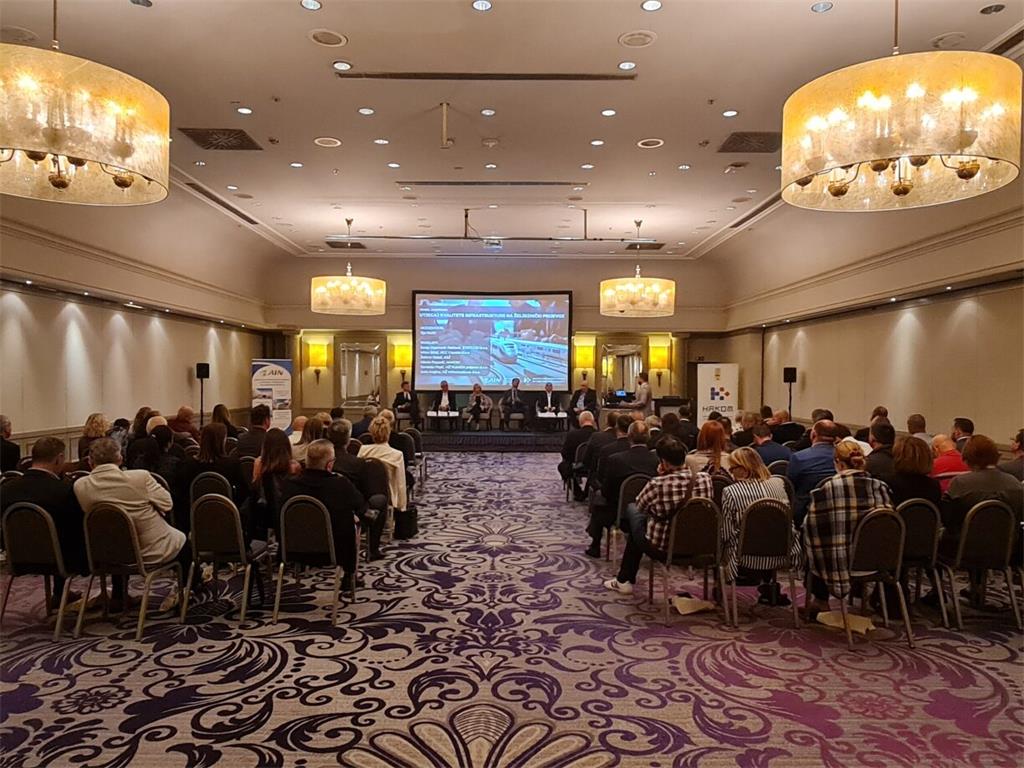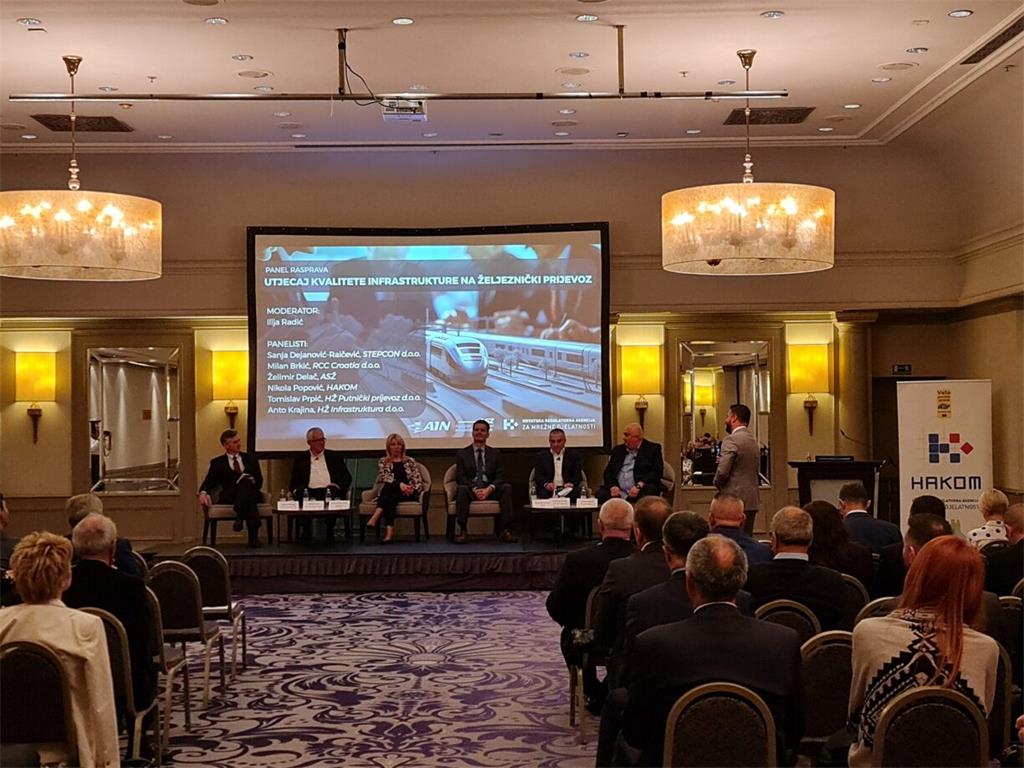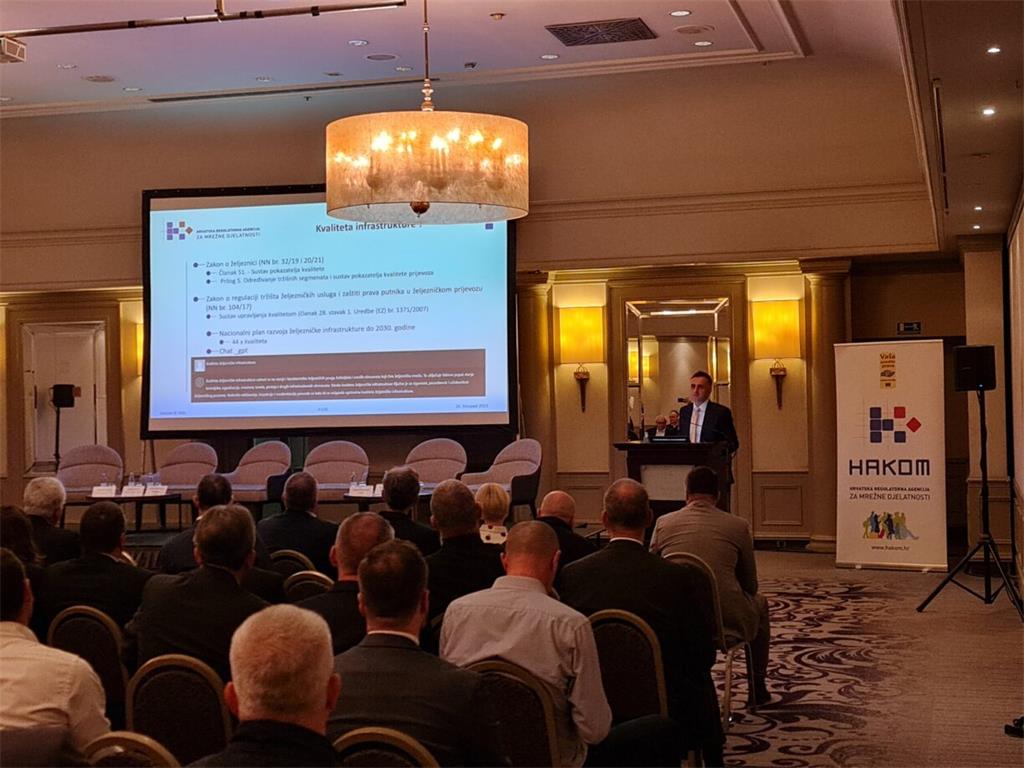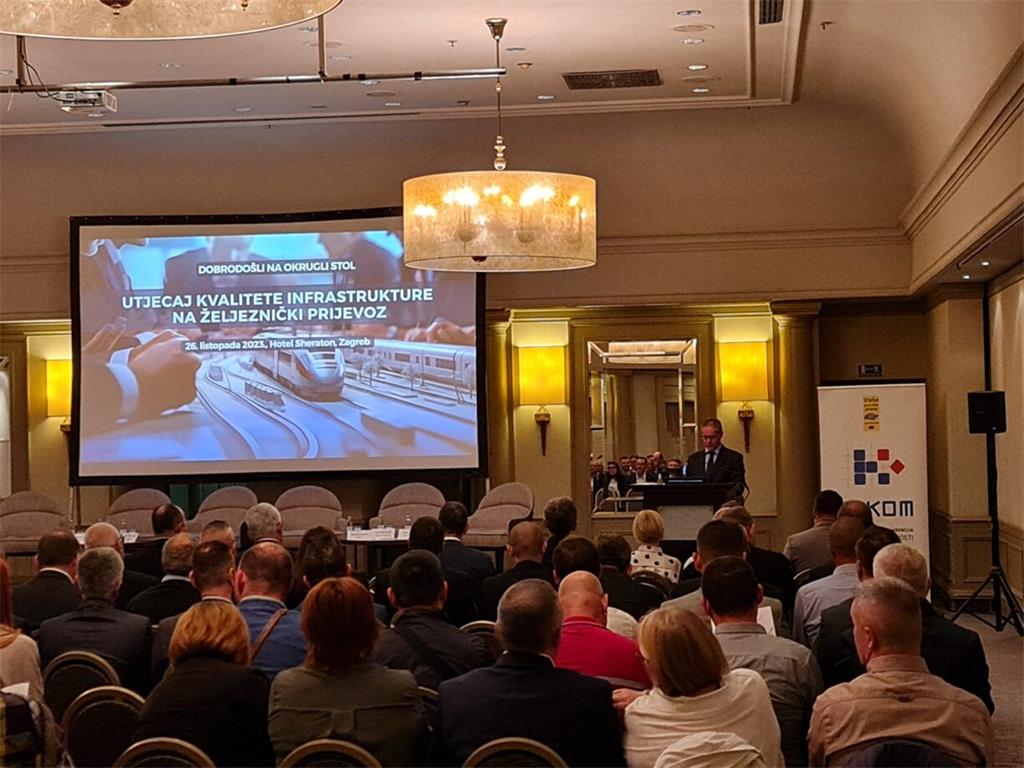Round table on “Impact of infrastructure quality on rail transport”
Zagreb, 27 October 2023 — Following the invitation of the organizers, the Croatian Regulatory Authority for Network Industries (HAKOM), the Railway Safety Agency (ASZ) and the Air, Maritime and Rail Traffic Accident Investigation Agency (AIN) a round table was held on discussion on “Impact of infrastructure quality on rail transport”. Within the scope of the round table a panel discussion was held on key issues related to railway infrastructure quality.
The long absence of investment in railway infrastructure places rail transport at the back of the entire transport system, and the quality of the railway infrastructure is an essential element of the development of the rail system. Therefore, the topic of this event was to discuss what the essential parameters of the quality of infrastructure are and how they affect the development and current situation in the railways.
The event brought together a large number of stakeholders in the rail services market, including domestic and international representatives. The participants were welcomed by representatives of the organisers Tonko Obuljen, President of the Council at HAKOM, Alana Vukić, Director at AIN and Želimir Delač, Director at ASŽ.
We all have as a goal to make the railway system as competitive as possible in the entire transport system, not only in the Republic of Croatia, but as part of important corridor routes. We hope that rail traffic in Croatia will soon register a large number of satisfied users, and that freight and passenger traffic will relieve road traffic. These are, however, the EU’s objectives, as well as ours – says Tonko Obuljen, President of the Council at HAKOM.
Želimir Delač from ASŽ stressed that the quality of the system lies on the quality of the infrastructure manager, and that the question of quality is also a matter of safety. It is time to change professional experiences and open up current issues. —said the Director of ASZ.
In the presentation part, the participants had the opportunity to hear the challenges faced by freight undertakings during the closure of railway lines in the process of the reconstruction and numerous traffic delays, how it affects their business, as well as how the regulation of the rail services market is being implemented and what the profession in neighbouring countries says.
A Bright Story of renewal from the neighbourhood
The guest presenters from Serbia showed that all renovations and modernisations do not have to mean the complete closure of certain sections of the railways. In the regime without a complete suspension of railway traffic, with a construction deadline of only 81 hours and four and a half hours a day traffic closure, 105 meters long, bridge was renovated on the line Vrbnica – Bar in Montenegro. The contractors negotiated with the infrastructure manager for two months to be granted a longer closure with a complete suspension of traffic, which was finally granted, but with great effort.
Although drastically short deadlines for carrying out works are desirable for undertakings, the technological feasibility of the works foreseen in the project must be taken into account when planning the traffic flow regime.
—Restriction of working hours significantly affects the safety and quality of works. The technical aspect should be at least equally important, if not more important than the commercial factor when deciding on working time during the execution of works. — explained the CEO of STEPCON Sanja Dejanović-Raičević.
Input costs depend on the state of the infrastructure
Freight undertakings say that modernisation and renewal in the railway belt, the closure of individual sections, implementing easy train journeys due to poor condition of siding, generate additional costs, most often due to the implementation of additional hours of staff work, reduced utilisation of leased locomotives, and are often faced with cancellations of contracted transport due to exceeding the planned time limits for transport execution.
In Rail Cargo Carrier Croatia, the infrastructure manager should pay particular attention to the maintenance of infrastructure subsystems and traffic regulation so that operators can consume the infrastructure manager’s services with guaranteed quality.
—Most of the problems that arise in freight transport and the state of infrastructure subsystems can be solved by applying technical and technological solutions available today- said Milan Brkić , Director at RCC Croatia.
During the panel discussion, the representatives of HAKOM, ASŽ, RCC, HŽPP, HŽI and STEPCON shared their experiences and efforts in the work in the railway sector, especially in relation to the quality of infrastructure in rail transport, who also answered a number of questions that the participants in the audience had the opportunity to ask.
At the end of the discussion, the quality of the infrastructure was rated “good”, and the panellists agreed that investments in infrastructure were essential, but also that it is necessary to pay attention to the business of all stakeholders in the rail services market.
For additional information please contact:
Croatian Regulatory Authority for Network Industries (HAKOM)
- Roberta Frangeša-Mihanovića 9 Street
- 10110 Zagreb, Croatia
- Tel. + 385 (0) 1 700 70 07
- Fax + 385 (0)1 700 70 70
Media inquiries can be submitted online using HAKOM’s official website: www.hakom.hr
About Hakom
HAKOM - Croatian Regulatory Authority for Network Industries – ensures preconditions for a fair market competition, stable growth and environment for innovations in the electronic communications and postal services market. HAKOM protects users’ interests and the possibility of choice among various communications and postal services at affordable prices, defines sustainable competitive conditions for operators and service providers under fair conditions for return on investment, and provides support to economic growth, public services and the quality of life in the Republic of Croatia by using modern technologies. HAKOM’ strategic goals are: to promote regulation of the electronic communications and postal services market, to support growth of investments and innovations in the electronic communications and postal services market, to provide efficient use of limited resources, to accelerate the growth of broadband products and services, to provide affordable offers of communications and postal services, to provide protection and informing of users, to build an efficient and comprehensive information system, to define and implement efficient processes, and to acquire multi-disciplinary expertise in market regulation.




